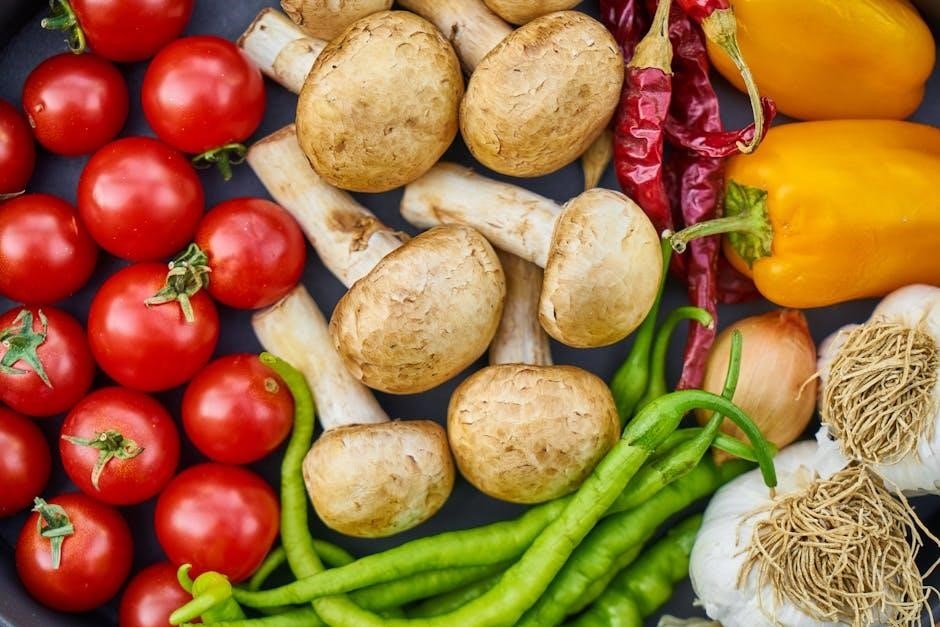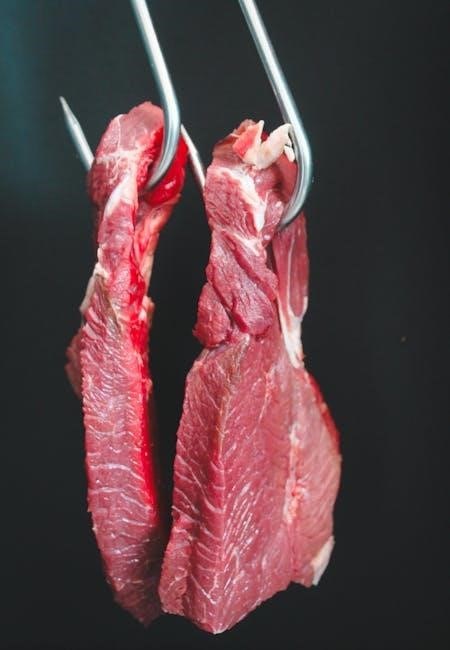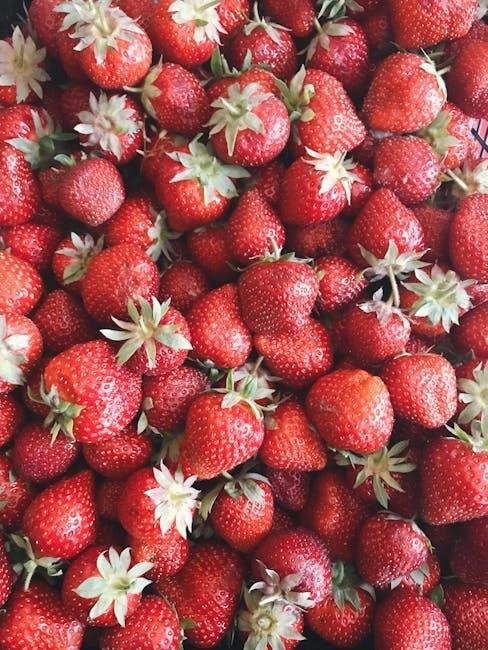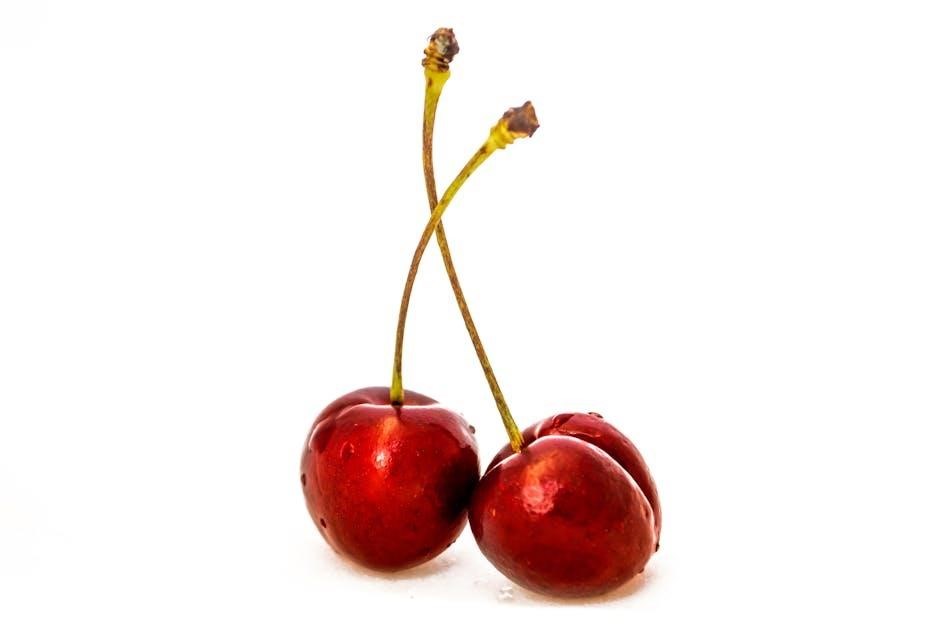The Primal Diet focuses on whole‚ nutrient-rich foods‚ excluding processed and high-carb items․ It emphasizes meats‚ fish‚ vegetables‚ and healthy fats‚ promoting a hunter-gatherer-inspired eating approach for optimal wellness․
Overview of the Primal Diet
The Primal Diet‚ inspired by the eating patterns of our hunter-gatherer ancestors‚ focuses on whole‚ unprocessed foods to promote optimal health and weight management․ It eliminates harmful modern foods like grains‚ sugars‚ and processed items‚ emphasizing meats‚ fish‚ vegetables‚ and healthy fats․ This approach aims to align eating habits with human evolutionary biology‚ reducing chronic disease risks and improving energy levels․ By avoiding inflammatory foods and prioritizing nutrient-dense options‚ the Primal Diet supports a balanced lifestyle․ It is often compared to the Paleo Diet but includes some flexibility‚ such as occasional indulgences like dark chocolate or alcohol․ The diet is designed to be sustainable and adaptable‚ helping individuals achieve long-term wellness goals․
Importance of a Food List for the Primal Diet
A food list is essential for the Primal Diet as it provides clarity and guidance on what to eat and avoid․ By focusing on whole‚ nutrient-dense foods like meats‚ fish‚ vegetables‚ and healthy fats‚ the diet eliminates harmful modern additions such as grains‚ sugars‚ and processed items․ A well-structured food list helps individuals avoid guesswork‚ ensuring they stay compliant with the diet’s principles․ It also emphasizes the importance of avoiding inflammatory foods and prioritizing those that align with human evolutionary biology․ This structured approach makes it easier to maintain the diet long-term‚ promoting better health outcomes and reducing the risk of chronic diseases․ A clear food list is invaluable for making informed choices and achieving the diet’s goals effectively․

Core Principles of the Primal Diet
The Primal Diet focuses on whole‚ nutrient-dense foods like meats‚ fish‚ vegetables‚ and healthy fats‚ eliminating harmful modern additions such as grains‚ sugars‚ and processed items․
Foods to Emphasize
The Primal Diet encourages focusing on nutrient-dense‚ whole foods that align with ancestral eating patterns․ Emphasize grass-fed meats‚ wild-caught fish‚ and pasture-raised poultry for high-quality protein․ Include a variety of colorful vegetables‚ such as leafy greens‚ broccoli‚ and bell peppers‚ which are rich in vitamins and minerals․ Healthy fats like avocado‚ olive oil‚ and coconut oil are also central‚ providing sustained energy and supporting overall health․ Nuts and seeds‚ such as almonds‚ walnuts‚ and chia seeds‚ offer beneficial fats and fiber․ Organ meats‚ like liver and kidney‚ are packed with essential nutrients․ Fresh fruits‚ especially berries and citrus‚ are included in moderation for natural sweetness and antioxidants․ This approach ensures a balanced and nourishing diet that avoids processed and harmful modern additives․
Foods to Avoid
The Primal Diet excludes foods that are processed‚ high in carbohydrates‚ or harmful to overall health․ Avoid grains‚ including bread‚ pasta‚ rice‚ and cereals‚ as they are high in carbs and contain gluten․ Sugary foods like sodas‚ candies‚ and baked goods should be eliminated due to their empty calories and health risks․ Legumes‚ such as beans and lentils‚ are also excluded because they contain phytotoxins and lectins․ Dairy products‚ especially those from grain-fed cows‚ are often avoided‚ though some versions of the diet allow small amounts․ Processed foods‚ junk snacks‚ and fried foods are harmful and should be avoided․ Vegetable oils like canola and soybean oil are high in omega-6 fatty acids‚ which can lead to inflammation․ Avoiding these foods helps reduce inflammation‚ improve weight loss‚ and promote overall wellness․

Detailed Primal Diet Food List

This section provides a comprehensive breakdown of Primal Diet-approved foods‚ categorized into meats‚ fish‚ vegetables‚ fruits‚ healthy fats‚ nuts‚ seeds‚ and organ meats for easy reference․
Meat and poultry form the cornerstone of the Primal Diet‚ emphasizing grass-fed beef‚ pasture-raised chicken‚ and wild game․ These options are rich in protein and essential nutrients like iron and zinc․ Opt for lean cuts or fatty meats‚ depending on your dietary goals․ Avoid processed deli meats high in sodium and additives․ Organ meats like liver and kidney are also encouraged for their high vitamin content․ Always choose organic‚ hormone-free sources to maximize health benefits․ Incorporating a variety of meats ensures a balanced intake of amino acids and fats‚ supporting overall well-being․ Moderation is key‚ as overconsumption can lead to imbalance․ Pair with vegetables and healthy fats for a complete meal․ Fish and seafood are integral to the Primal Diet‚ offering essential omega-3 fatty acids and high-quality protein․ Fatty fish like salmon‚ mackerel‚ and sardines are particularly beneficial‚ as they are rich in EPA and DHA‚ which support heart and brain health․ Opt for wild-caught options to avoid contaminants and ensure higher nutrient content․ Other recommended varieties include cod‚ tilapia‚ and trout․ Shellfish such as shrimp‚ mussels‚ and oysters are also encouraged for their mineral-rich profiles․ When selecting seafood‚ prioritize sustainability and freshness to minimize environmental impact and maximize health benefits․ Avoid farmed fish when possible‚ as they may contain lower omega-3 levels and higher toxins․ Incorporate fish and seafood into your meals 2-3 times weekly for a balanced and nutritious diet․ Vegetables play a vital role in the Primal Diet‚ providing essential vitamins‚ minerals‚ and fiber․ Focus on non-starchy‚ nutrient-dense options like leafy greens such as spinach‚ kale‚ and arugula․ Broccoli‚ cauliflower‚ and asparagus are also excellent choices due to their high vitamin content and low carbohydrate levels․ Root vegetables like sweet potatoes and carrots are included in moderation‚ offering natural sweetness and fiber․ Avoid high-carb vegetables such as potatoes‚ corn‚ and peas․ Opt for organic and locally sourced produce when possible to ensure maximum nutrient intake․ Vegetables should be consumed in variety to maintain a balanced diet‚ supporting overall health and energy levels․ Incorporate them into meals creatively‚ such as in salads‚ stir-fries‚ or roasted dishes‚ to enhance flavor and nutrition․ Fruits are a natural source of vitamins‚ antioxidants‚ and fiber in the Primal Diet․ Emphasize low-sugar‚ nutrient-rich options like berries (strawberries‚ blueberries‚ raspberries)‚ which are high in antioxidants and low in carbs․ Citrus fruits such as oranges and grapefruits provide vitamin C and electrolytes․ Apples and pears are good choices due to their fiber content․ Tropical fruits like bananas and mangoes should be consumed in moderation because of their higher sugar content․ Avoid dried fruits and fruit juices‚ as they are high in sugar and lack fiber․ Fruits should be enjoyed in season and in limited portions to maintain a balanced intake․ They add natural sweetness and variety to meals‚ supporting overall health and satisfaction․ Pairing fruits with nuts or fats can help regulate blood sugar levels․ Healthy fats and oils are essential for energy‚ hormone production‚ and nutrient absorption in the Primal Diet․ Emphasize sources like avocado‚ olive oil‚ coconut oil‚ and animal fats from grass-fed or pasture-raised animals․ Avocado oil and ghee are also excellent choices‚ offering stability for high-heat cooking․ Fatty fish‚ such as salmon‚ provide omega-3 fatty acids‚ which support heart and brain health․ Nuts and seeds‚ like macadamia nuts and flaxseeds‚ are good in moderation․ Avoid processed and industrial oils‚ such as canola‚ soybean‚ and vegetable oils‚ as they are high in omega-6s and inflammatory․ Use these fats liberally to enhance meals and satisfy hunger․ They are vital for maintaining a balanced and nutrient-rich diet‚ promoting overall well-being and energy levels․ Always choose high-quality‚ unrefined sources to maximize health benefits․ Nuts and seeds are nutrient-dense additions to the Primal Diet‚ offering healthy fats‚ proteins‚ and fiber․ Opt for unsalted‚ unsweetened‚ and unroasted varieties to avoid harmful additives․ Almonds‚ walnuts‚ macadamia nuts‚ and pistachios are excellent choices‚ as are seeds like chia‚ flax‚ and pumpkin․ These provide omega-3 fatty acids‚ antioxidants‚ and minerals like magnesium and zinc․ However‚ moderation is key due to their high calorie content․ Avoid processed nuts with added oils or sugars․ Nuts and seeds are ideal snacks or toppings for salads and meals․ They support heart health and satiety‚ making them a valuable part of a balanced Primal Diet․ Always choose high-quality‚ fresh options to reap their nutritional benefits․ Organ meats are a cornerstone of the Primal Diet‚ offering unparalleled nutrient density․ They provide essential vitamins‚ minerals‚ and amino acids‚ such as iron‚ zinc‚ and B vitamins․ Popular choices include liver‚ kidney‚ tongue‚ and bone marrow‚ which are rich in bioavailable nutrients․ These foods are sourced from grass-fed‚ pasture-raised animals to ensure optimal quality and avoid harmful additives․ Organ meats support energy production‚ immune function‚ and overall health; While they can be consumed in moderation‚ some individuals may need to limit intake due to high vitamin A content․ Incorporating organ meats into meals enhances nutritional diversity and aligns with the Primal Diet’s focus on ancestral eating patterns․ They are a flavorful and nutritious addition to a balanced diet․Meat and Poultry
Fish and Seafood
Vegetables
Fruits
Healthy Fats and Oils
Nuts and Seeds

Organ Meats




